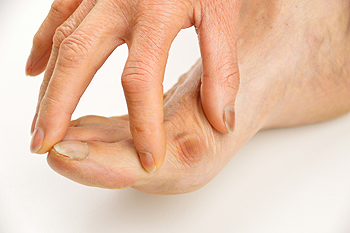 When the foot incurs abnormal pressure from wearing incorrect footwear, a corn may develop. A corn is a small area of thickened skin, usually appearing on the tops of the toes or the balls of the feet. These are typically referred to as hard corns, often producing redness, swelling, and pain. Soft corns are usually found between the toes, appearing white and having a rubbery texture. Both types of corns are produced by excessive friction, typically caused by wearing ill fitting shoes and from moisture accumulating between the toes. Many people will develop corns throughout their lives, and it is one of the most common foot ailments. It’s important to prevent corns from developing by being aware of specific areas of the foot that often endure pressure. If you stand for most of the day, it’s suggested to take ample time to find shoes that fit properly. Additionally, the skin will benefit significantly by being moisturized. Please consult with a podiatrist for a proper diagnosis and information on how painful corns can be removed.
When the foot incurs abnormal pressure from wearing incorrect footwear, a corn may develop. A corn is a small area of thickened skin, usually appearing on the tops of the toes or the balls of the feet. These are typically referred to as hard corns, often producing redness, swelling, and pain. Soft corns are usually found between the toes, appearing white and having a rubbery texture. Both types of corns are produced by excessive friction, typically caused by wearing ill fitting shoes and from moisture accumulating between the toes. Many people will develop corns throughout their lives, and it is one of the most common foot ailments. It’s important to prevent corns from developing by being aware of specific areas of the foot that often endure pressure. If you stand for most of the day, it’s suggested to take ample time to find shoes that fit properly. Additionally, the skin will benefit significantly by being moisturized. Please consult with a podiatrist for a proper diagnosis and information on how painful corns can be removed.
If you have any concerns regarding your feet and ankles, contact one of our podiatrists of Sayville Foot Care. Our doctors will treat your foot and ankle needs.
Corns: What Are They? and How Do You Get Rid of Them?
Corns can be described as areas of the skin that have thickened to the point of becoming painful or irritating. They are often layers and layers of the skin that have become dry and rough, and are normally smaller than calluses.
Ways to Prevent Corns
There are many ways to get rid of painful corns such as wearing:
- Well-fitting socks
- Comfortable shoes that are not tight around your foot
- Shoes that offer support
Treating Corns
Treatment of corns involves removing the dead skin that has built up in the specific area of the foot. Consult with Our doctors to determine the best treatment option for your case of corns.
If you have any questions please feel free to contact our office located in Sayville, NY . We offer the newest diagnostic and treatment technologies for all your foot and ankle needs.
